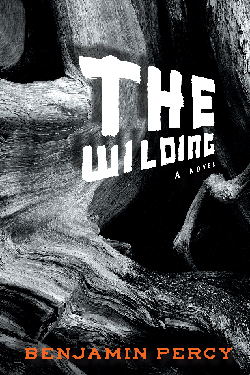The Wilding
by Benjamin Percy
reviewed by Mark Chiusano
There is a moment in the middle of Benjamin Percy’s debut novel, The Wilding, when Justin, the main character, only wants to return to Bend. “Things have always been fine and safe in Bend,” he thinks. At that moment Justin is stuck on a hunting trip with a marauding bear somewhere in the pine trees, a young son asking whether they’re going to live or die, an aging and cantankerous father who has left them to find the bear himself, and no cell phone reception, even after Justin climbs to the top of a tree. He can see Bend blinking at the edge of the valley—close, but still too far away.
This is Oregon, the setting of much of Percy’s earlier work, an alternately mountainous, forested, and desert region that Percy captures almost like a character. It is a country that, in The Wilding, is changing, losing its wildness; the hunting trip that occupies the majority of the book takes place in Echo Canyon, which is set for redevelopment as a golf course in the coming months. Swirling around the central story—while Justin and his party engage in an increasingly primeval race against nature—are other subplots, involving, for example, a Native American named Tom Bear Claws, who gives speeches on the Great Spirit in middle-school classrooms while secretly ceding land from his tribe in exchange for a casino.
Percy pays homage here to the likes of Wallace Stegner and William Kittredge, along with James Dickey’s Deliverance, following a tradition of wilderness writing, survival, and also the survival of the wilderness. Wildness is embodied in the novel in the character of the locksmith Brian, also from Bend. Brian, newly returned from the war in Iraq, is experiencing severe trauma. As the novel opens, we see him constructing a full-body suit of beaver pelts, which he wears as he wanders the forests around the town. As the novel progresses, Brian becomes obsessed with Justin’s wife, Karen, who has been left at home for the weekend while the men go hunting.
This link between Brian and Justin forces us to compare the veteran to the protagonist, and halfway through the novel we begin to realize that Justin is the less interesting of the two. There are only so many times a grown man can say, “I mean what the hell, Dad,” and even Karen acknowledges that “her husband is defined by hesitation.” Justin is given to whining about his fretted relationship with his father, his collapsing marriage, his longed-for return to “real life” as an English teacher with books and papers and marking homework.
“Things have always been fine and safe in Bend. They will laugh about all of this in Bend,” Justin thinks, but it is, in fact, in Bend where safety and sanity have gone to die, and where the devastated veteran, Brian, is roaming. With Brian, Percy returns to the state of mind and subject matter of his best known work, the prize-winning short story “Refresh, Refresh,” about two teenagers in central Oregon dealing with enlistment and fathers at war. Like them, Brian seems always on the cusp of violence, not at home even though he has nowhere else to go, unsure what to be or how to act. Like them, Brian’s father issues and his own struggles seem more real and more extreme, even though they are given less page time than Justin’s self-reflective angst. While he is on stage in the novel, Brian is terrified and terrifying, loping along the sides of the highway in his bear suit, in and out of people’s houses, their imaginations, and the nightly news.
In Brian’s scenes we are asked to consider what true wildness is: the idea that although Bend is far from Baghdad, and some miles even from Echo Canyon, there is enough questioning and fear and confusion in the residents there to account for a whole world of warfare and wilderness.
Published on June 20, 2013

